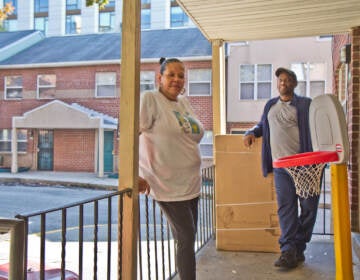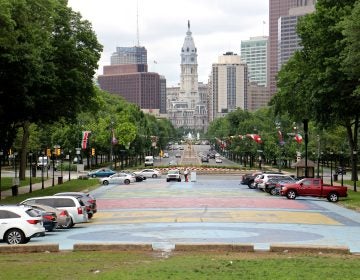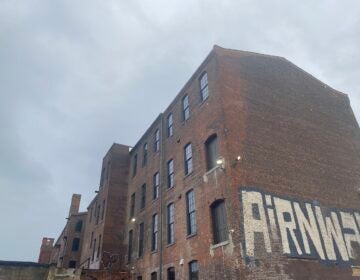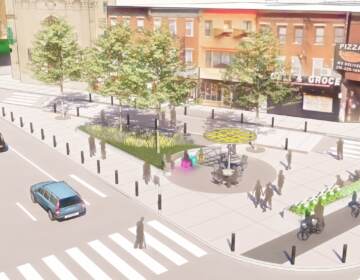Planning for a $15 million rec center begins with board game in Fairhill
A board game is helping Philadelphia officials determine the future of a public works project in a community often left out of public decision-making.
Listen 3:52Two dozen residents of North Philadelphia’s Fairhill neighborhood recently gathered in a community hall to play a board game with unusual stakes: a new rec center.
Designed by Lisa Jo Epstein, the founder and director of a theater-based community engagement company, Just Act in partnership with HACE, the game was designed to involve Fairhill residents in a $15 million rec center renovation.
The project, which will combine the Mann Older Adult Center and Rivera Recreation Center, is part of the Parks and Recreation Department’s Rebuild initiative, funded by Mayor Jim Kenney’s tax on sugary beverages.
“It’s supposed to be play, but we take it seriously because we are from the community,”said Lois Williams, who lives down the block from the recreation center site at 5th and Allegheny Avenue. “We want things to be the way we need it to be for us.”
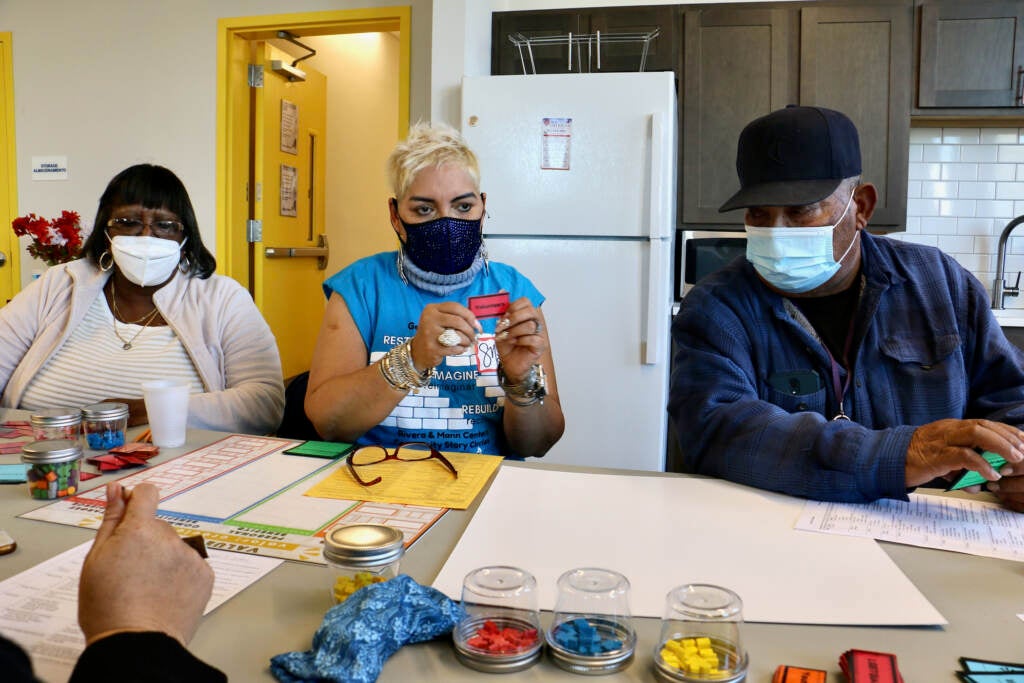
Williams wants to see the new rec center used for after school programs for children, and she wants to take cooking and gardening classes. By the time the new Older Adults Center opens next fall, she will have aged into it and is looking forward to its outdoor garden area.
“I have a nice backyard and I really would like to get into gardening,” she said. “I have houseplants, but I have none outside of my yard.”
The game is helping her articulate that vision to city decisionmakers. Part of an 18-month process organized by HACE, the goal is to engage community members to determine what they want out of a 21st century recreation center.
Instead of surveying residents and compiling responses, HACE used storytelling, performance, and play for the serious work of neighborhood development.
Each team played with its own bilingual board, laid out with parking spaces, a stack of cards identifying values and activities, and colored game pieces.
Each board was titled with one of 10 words: inclusion, beauty, opportunity, generosity, growth, resilience, respect, sense of belonging, sense of ownership, and safety/security.
“These top 10 values emerged from 179 people from the neighborhood who noted that these values were most important to them,” Epstein said.
The next step was to place cards that identify activities reflecting those values, which could be offered at the new rec center. Then, they matched them with people who would benefit most from those activities.
Turning stories into a vision
Epstein said the board game is the second phase of this community envisioning process, which she dubbed Act II. Act I was a series of story circles that were held over the summer.
The neighborhood story circles were facilitated by Epstein’s story engagement team, trained to listen for key ideas in the participants’ shared memories and experiences. Like an improvisation troupe, the performers would immediately devise and act out theatrical scenes that brought those stories to life.
Inspired by the talkback concept created by John O’Neal and the Free Southern Theater during the Civil Rights Movement of the 1960s, the performances reflect the lived experiences of the audience members present. They are called “gift-backs.”
“So many communities are studied and told that they matter, and then the people who do those studies don’t come back. It’s extractive,” said Epstein. “By building in performance gift-backs, it was an opportunity to acknowledge everybody in the room for their value and expertise.”
The theatrical approach starts community discussions on a different foot: Instead of beginning with a problem and figuring out how to solve it, the Just Act approach is to start with what is right with a community and go from there.
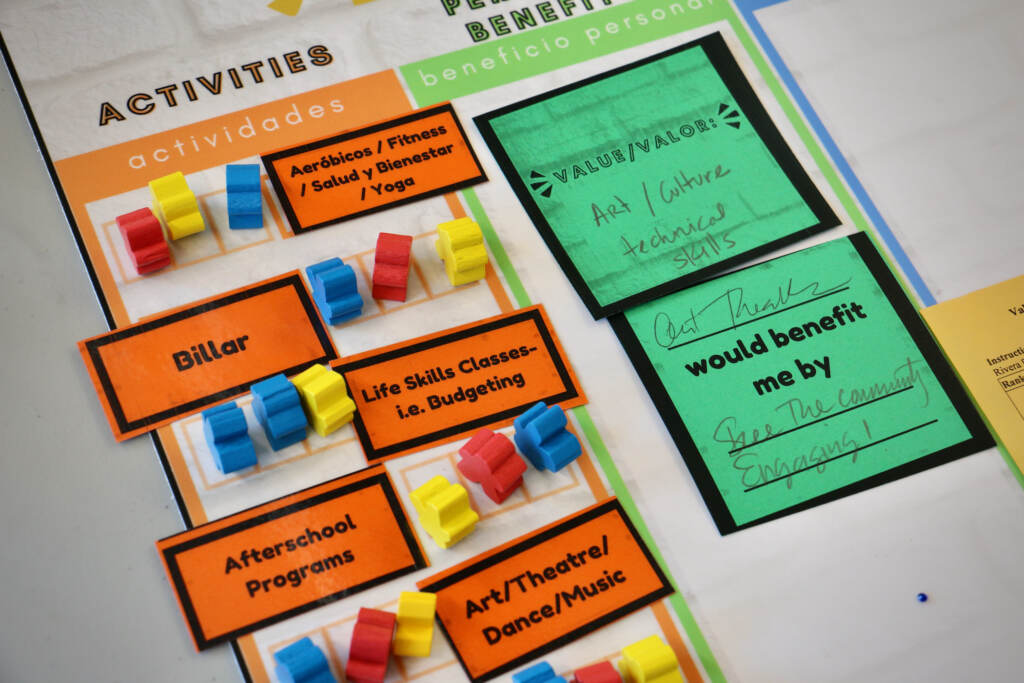
“When we look statistically at everything that’s wrong about a certain neighborhood we forget there are people here, and there are assets,” said Naida Montes from the story engagement team. “‘What’s your story? What are the assets? What are the strengths?’ You’re rerouting the conversation.”
Participants were asked to talk about any personal experience in the neighborhood — all the better if those experiences were related to the rec center. Harry Tapia, who grew up in the neighborhood and now works as HACE’s operations manager, offered his own story, having spent nearly his entire life at the Rivera Recreation Center.
“I did my youth work there. That was my first job,” said Tapia, 38. “I volunteered there all the way from middle school. Even when I worked at HACE, I played in the 30-and-over basketball league.”
The story sessions were meant to show how people use the center (or don’t) and how they felt about it.
“One of the elements that we invite into this process, very deliberately, is people’s emotions,” said Sasia Monteiro, the director of HACE’s Community Advisory Committee. “How have these things made you feel? That is really vital data.”
How to gamify planning
Epstein’s team mined the experiences and memories from the story sessions for critical ideas, which they incorporated into the board game. Players reviewed the playing cards written with concepts like education, art, fitness, vocational development, personal financial budgeting, cooking, and billar (billiards).
Then they pushed around other cards that reflected who would benefit from those activities: young adults, parents, and abuelos (grandparents).
”This neighborhood is largely Hispanic,” said Tapia. “There’s a big push regarding Latin cuisine. How can we integrate that into the activities that the older adults are having?”
Participants tried to help each other understand the object of the game. The room’s lively acoustics made it fill up quickly with chaotic sound, making it hard for anyone of any language to understand what was being said.
“I see other people around me get a little frustrated,” said Luz Crespo, a bilingual player. “I was helping a person that was hard of hearing, and the other one was too sensitive to sound.”
Having participants talk and listen to each other is a critical part of the game.
What sets this playful community feedback approach apart from a more straightforward survey questionnaire is the participants need to work together to both understand the rules of the game and to push the ideas around until they make sense on the board.
“It’s a board game, so it doesn’t have a lot of barriers that we have when we are writing,” said Juliana Ortiz-González, the incoming CEO of the nearby Taller Puertorriqueño cultural center, who also came to play. “It’s a very dynamic and very normal thing to do. We all had our game, even if it was cards, in our house, so it’s a good way to listen very openly.”
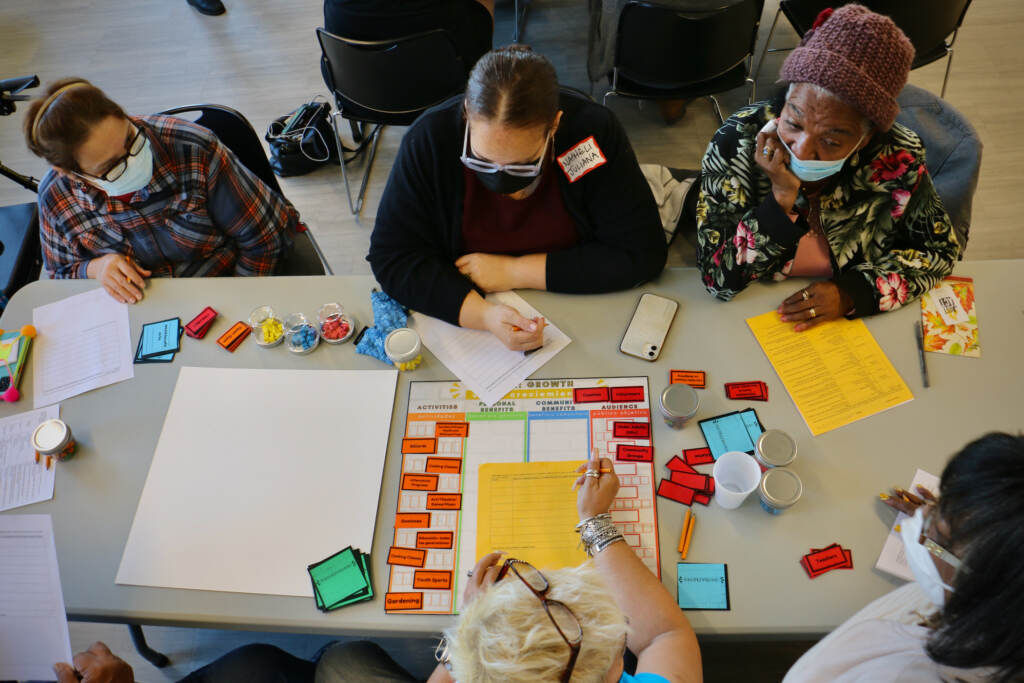
The director of HACE’s Community Advisory Committee, Stasia Monteiro, said residents in this mostly Latino neighborhood often feel left out of the planning process. Many don’t have a lot of money or don’t speak English.
“It speaks to shifting this dynamic where people offer their feedback and it kind of just goes into a void and then they don’t know what happened to it,” Monteiro said. “Whereas here it’s like, ‘All right, you are getting that back right away and it’s being built into this game, which is ultimately building our programming blueprint.’”
One goal of the renovated recreation center will be to foster intergenerational exchange. Before, the Mann Center for Older Adults and the Rivera Recreation Center shared a structure, but functioned as two separate spaces with their own entrances on either side of the building. The two constituents would never cross paths inside the center.
The new space will have a shared entrance, where the younger and older users will be able to mix.
“Usually seniors are like, ‘Oh, kids are bouncing the ball, or being loud. We don’t want them in our space,’” said Tapia. “But this is a great way to use the design to bring everybody together and really enjoy the center together.”
There is another “data jam” gaming session scheduled for Dec. 11 in the community center at Visitation Church on Kensington Avenue. After the sessions, Epstein’s team takes a photo of each game board to document where all the pieces ended up.
The final act of the process will be to translate all the information on the game boards into a report, reflecting what the community wants from its new rec center. That report, expected in the spring, will be presented to the community for revision and made available to Philadelphia Parks and Recreation, as well as any future partners involved in the operation of the center.
 WHYY is one of over 20 news organizations producing Broke in Philly, a collaborative reporting project on solutions to poverty and the city’s push towards economic justice. Follow us at @BrokeInPhilly.
WHYY is one of over 20 news organizations producing Broke in Philly, a collaborative reporting project on solutions to poverty and the city’s push towards economic justice. Follow us at @BrokeInPhilly.

Subscribe to PlanPhilly
WHYY is your source for fact-based, in-depth journalism and information. As a nonprofit organization, we rely on financial support from readers like you. Please give today.




